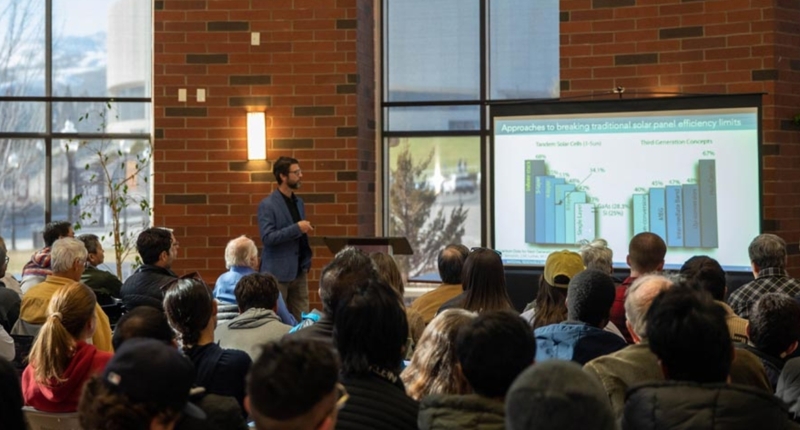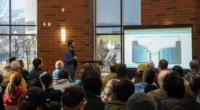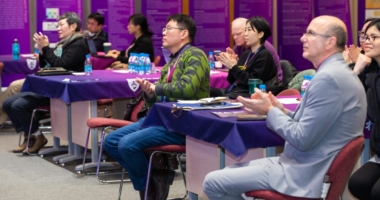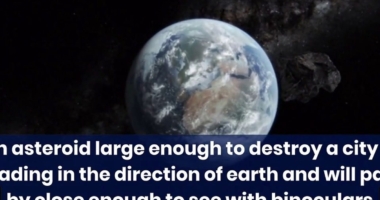Solar panel scientist Joey Luther from the National Renewable Energy Laboratory (NREL) recently participated in the Energy Solutions Forum at the University of Nevada, Reno. Luther’s research focuses on improving the efficiency of solar panels using chemistry and engineering. He studies perovskite semiconductors and quantum dot solar cells, which have unique properties that retain much more energy in the form of electricity rather than heat, making them more efficient and cost-effective. Although new solar technologies still face a few challenges, researchers analyze the reduction in carbon emissions over a long period of operation in addition to the makeup of the products and their ability to recycle them. One of the biggest challenges is the long-term operational stability of solar panels. The next Energy Solutions Forum will feature Jack Norbeck from Fervo Energy, discussing geothermal innovations such as horizontal drilling.
Solar panel scientist Joey Luther from the National Renewable Energy Laboratory (NREL) recently participated in the Energy Solutions Forum hosted by the Colleges of Science and Engineering at the University of Nevada, Reno. Luther’s research focuses on improving the efficiency of solar panels using chemistry and engineering.
Luther studies both perovskite semiconductors and quantum dot solar cells, which have unique properties that retain much more energy in the form of electricity rather than heat, unlike commercial solar panels that generate heat at the cost of energy efficiency. Perovskites are salts that form into a novel class of hybrid semiconductors, and they are easy to deploy. Luther specifically studies lead halide organic-inorganic perovskites, which can withstand defects, making them more efficient for manufacturing solar panels at a much faster rate, leading to cost savings.
Additionally, researchers were able to put the crystalline semiconductors into a liquid, spread the liquid on a surface, and let it dry like ink on paper, making it possible to create a layer of perovskite “ink” that becomes a useful semiconductor. By combining technologies, perovskite/silicon tandem solar cells have been made with up to 32.9% efficiency. This allows for the creation of a panel that generates 50% more electricity than a silicon panel alone with the addition of a few extra layers and an ink coating across the top of the device.
Luther’s research contributes to making solar energy cheaper than traditional fossil fuel electricity. Solar energy was once a small sector of energy production, but it has grown tremendously throughout Luther’s career. Luther’s work on perovskite semiconductors and quantum dot solar cells could help make solar energy accessible to more people while improving its efficiency.
Solar technologies have made significant advancements in recent years, but they still face some challenges. One of these is the environmental implications of various solvents used and the use of lead in solar panels. However, researchers need to analyze the reduction in carbon emissions over a long period of operation in addition to the makeup of the products and their ability to recycle them.
Another challenge is the long-term operational stability of solar panels. While the new solar technologies are very low-cost and efficient, they must last as long as silicon panels, which have warranties of 25-30 years and are pushing for 50 years without maintenance. According to Luther, the lifespan competition perovskite solar cells face is the biggest challenge.
Despite these challenges, Luther and his colleagues are optimistic that the solar cells will make a difference in combatting climate change. They hope that the Energy Solutions Forum will encourage scientists to pursue climate solutions in their own research to make clean renewable energy the norm. Luther believes that there is no single technology that can achieve this goal and that even the ones that are not used on such a mass scale can be meaningful in the long run.
The next Energy Solutions Forum will be held on April 5 and will feature Jack Norbeck from Fervo Energy, who will discuss geothermal innovations such as horizontal drilling. Registration for the Energy Solutions Forum is open via Eventbrite.
Don’t miss interesting posts on Famousbio










